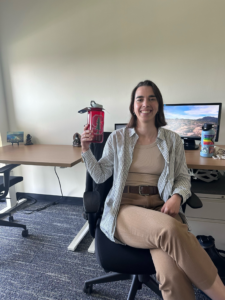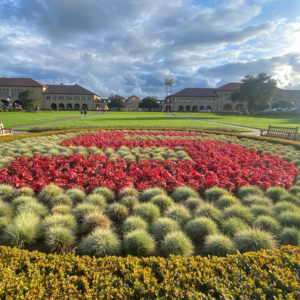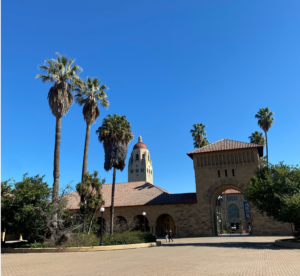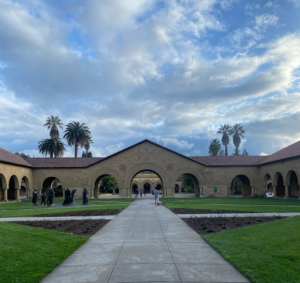Lydia Rupp at Stanford University

 My research stay took place from February 26 to March 22, 2024, at the Stanford Psychophysiology Laboratory (SPL) at Stanford University, California. The lab is led by Professor James Gross, who is a leading expert on emotion regulation and has developed the Process Model of Emotion Regulation. The model describes the development of an emotional episode as a five-step process. For each step, specific emotion-regulation strategies can be derived. I chose SPL as a host institution because of Prof. Gross’ expertise in the domain of emotion regulation and his extensive work on the application of the Process Model in various domains of psychology. In the study for EmpkinS subproject D02, participants are instructed to perform emotional facial expressions during a cognitive reappraisal task. As this is a novel paradigm, we were looking for additional expertise on the role of deliberate facial expressions of emotion for emotion regulation processes.
My research stay took place from February 26 to March 22, 2024, at the Stanford Psychophysiology Laboratory (SPL) at Stanford University, California. The lab is led by Professor James Gross, who is a leading expert on emotion regulation and has developed the Process Model of Emotion Regulation. The model describes the development of an emotional episode as a five-step process. For each step, specific emotion-regulation strategies can be derived. I chose SPL as a host institution because of Prof. Gross’ expertise in the domain of emotion regulation and his extensive work on the application of the Process Model in various domains of psychology. In the study for EmpkinS subproject D02, participants are instructed to perform emotional facial expressions during a cognitive reappraisal task. As this is a novel paradigm, we were looking for additional expertise on the role of deliberate facial expressions of emotion for emotion regulation processes.
 Thus, the main aim for the research stay was to learn more about emotion regulation and novel ways to influence emotional processes, to gain a better understand of the dynamics of emotion regulation and attain insights into the relationship between emotion regulation and sleep. Gaining a better understanding on current emotion regulation models would serve to fortify the theoretical foundation for the current D02 study. The knowledge on emotion regulation and sleep would benefit the preparation for the second funding phase in D02, which will shift the focus from emotion regulation and depression to emotion regulation and sleep.
Thus, the main aim for the research stay was to learn more about emotion regulation and novel ways to influence emotional processes, to gain a better understand of the dynamics of emotion regulation and attain insights into the relationship between emotion regulation and sleep. Gaining a better understanding on current emotion regulation models would serve to fortify the theoretical foundation for the current D02 study. The knowledge on emotion regulation and sleep would benefit the preparation for the second funding phase in D02, which will shift the focus from emotion regulation and depression to emotion regulation and sleep.

During my time at SPL, I had the opportunity to join lab meetings from various labs, attend colloquia, visit classes, and meet with various members of the lab. Through these discussions with the lab members, I was able to acquire a deeper understanding of the emotion regulation process and related models, such as the Interactive Activation and Competition Framework for Emotion (IAC-E). Such models will inform the theoretical underpinnings of the novel emotion-enhanced cognitive reappraisal task and the emotion-based biofeedback system developed in project D02 by helping to explain how modifying facial emotional expressions might affect mood and cognitions. In discussions with Professor Gross, I received important feedback on study design and data evaluation in my current work. In the lab meetings, I gained deeper insights not only into the application of research on emotion regulation in various context (e.g. clinical or motivational psychology), but also on soft skills such as presentation skills.
 Overall, my research stay at SPL in Stanford provided me with valuable insights both into the topic of emotion regulation but also on academic culture in the United States. I was able to reach my aim of gaining more insights into the topic of emotion regulation and made valuable connections to leading researchers in the field. Furthermore, I was inspired by the culture of regular meetings to present one’s research, both within and across labs within a department. These meetings provided important opportunity on feedback on ongoing research, from which I was able to learn much.
Overall, my research stay at SPL in Stanford provided me with valuable insights both into the topic of emotion regulation but also on academic culture in the United States. I was able to reach my aim of gaining more insights into the topic of emotion regulation and made valuable connections to leading researchers in the field. Furthermore, I was inspired by the culture of regular meetings to present one’s research, both within and across labs within a department. These meetings provided important opportunity on feedback on ongoing research, from which I was able to learn much.